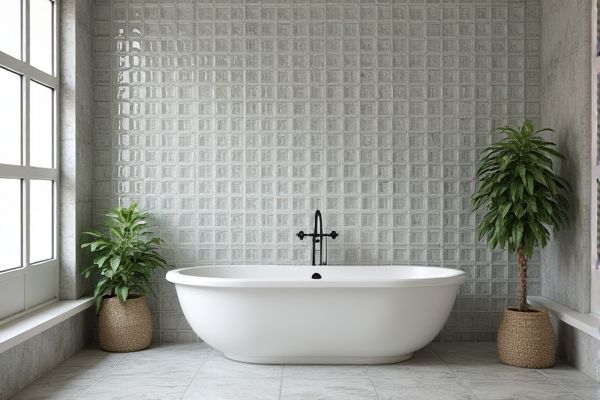
Glass block walls offer excellent natural light diffusion and a modern aesthetic with added privacy, while tiled walls provide versatile design options, durability, and easier maintenance for various spaces. Explore the rest of the article to determine which option best suits your design needs and lifestyle.
Table of Comparison
| Feature | Glass Block Wall | Tiled Wall |
|---|---|---|
| Material | Glass blocks, mortar | Ceramic, porcelain, stone, glass tiles |
| Light Transmission | High; allows natural light | Low; mostly opaque |
| Privacy | Moderate; translucent | High; solid surface |
| Durability | Very durable, impact resistant | Durable but can chip or crack |
| Water Resistance | Excellent when sealed properly | Excellent with proper grouting |
| Installation Complexity | More complex; requires skilled labor | Moderate; common DIY-friendly |
| Maintenance | Low; easy cleaning | Requires grout cleaning and sealing |
| Cost | Higher initial cost | Generally lower cost |
| Aesthetic | Modern, translucent, decorative | Varied styles, patterns, colors |
| Common Uses | Partitions, bathroom walls, decorative features | Bathrooms, kitchens, backsplashes, floors |
Introduction to Glass Block Walls vs Tiled Walls
Glass block walls offer enhanced natural light diffusion and privacy, making them ideal for spaces requiring both illumination and seclusion. Tiled walls provide a wide range of design options, durability, and ease of maintenance, suitable for areas exposed to moisture and frequent cleaning. Your choice between glass block and tiled walls depends on aesthetic preferences, functional needs, and the desired balance between light transmission and surface texture.
Aesthetic Appeal: Modern vs Traditional Styles
Glass block walls offer a sleek, modern aesthetic with their translucent texture and ability to diffuse light, creating an open and airy space ideal for contemporary interiors. Tiled walls, available in countless patterns, colors, and materials, provide a traditional charm and versatility that complements classic and rustic styles. Choosing between them depends on whether you prefer the minimalist, futuristic look of glass blocks or the timeless, customizable appeal of tiles.
Installation Process: Complexity and Time
Glass block wall installation involves precise alignment and mortar application, requiring skilled labor and typically takes longer due to curing times and custom fitting. Tiled wall installation is generally faster with simpler adhesive application and grout setting, suitable for DIY projects with less specialized expertise. The complexity of glass block walls often results in higher labor costs and extended project timelines compared to tiled walls.
Cost Comparison: Materials and Labor
Glass block walls typically incur higher material costs compared to tiled walls due to the specialized nature of glass blocks and their installation requirements. Labor expenses for glass block walls are also generally greater because of the precision needed for sealing and aligning each block, while tiled walls benefit from standard installation techniques that are faster and more widely available. Overall, tiled walls offer a more budget-friendly option in both materials and labor, making them popular for cost-conscious projects.
Durability and Longevity
Glass block walls offer exceptional durability due to their resistance to moisture, impact, and temperature fluctuations, making them ideal for wet or high-traffic areas. Tiled walls are durable when properly installed and sealed but may require more frequent maintenance to address issues like grout discoloration or cracking over time. Your choice between glass block and tiled walls should consider the environment and maintenance commitment to ensure long-lasting performance.
Maintenance and Cleaning Requirements
Glass block walls require minimal maintenance due to their non-porous surface that resists stains and mold, making cleaning easy with just mild soap and water. Tiled walls, especially those with grout, demand more frequent upkeep to prevent mold and discoloration, often needing specialized cleaners and grout sealing. Your choice impacts long-term cleaning efforts, with glass blocks offering a more hassle-free, durable option compared to the higher maintenance of tiled surfaces.
Light Transmission and Privacy Options
Glass block walls offer superior natural light transmission, allowing diffused daylight to brighten interior spaces while maintaining privacy through their textured surfaces. Tiled walls provide limited light transmission, often requiring additional lighting, but they offer greater privacy with a solid barrier and customizable finishes. Choosing between glass block and tiled walls depends on balancing the need for illumination with desired levels of privacy.
Insulation: Thermal and Sound Performance
Glass block walls offer superior thermal insulation due to their thick, air-trapped structure, reducing heat transfer and enhancing energy efficiency. Their dense, solid composition also provides excellent soundproofing by effectively blocking outside noise compared to traditional tiled walls. Choosing a glass block wall for your space improves both thermal regulation and acoustic comfort.
Suitable Applications and Room Usage
Glass block walls excel in areas requiring natural light diffusion and privacy, making them ideal for bathrooms, showers, and partition walls in offices or living spaces. Tiled walls are highly versatile, suited for wet areas like kitchens and bathrooms due to their water resistance, ease of cleaning, and design variety. Your choice depends on whether you prioritize light transmission and aesthetic separation with glass blocks or waterproof durability and design flexibility with tiles.
Final Verdict: Choosing the Best Option
Glass block walls offer superior natural light diffusion and enhanced privacy, making them ideal for modern and minimalist interior designs. Tiled walls provide greater design versatility with a wide range of colors, patterns, and textures, suitable for both classic and contemporary styles. The best choice depends on the desired aesthetic, functional requirements, and maintenance preferences specific to the space.
 homyna.com
homyna.com